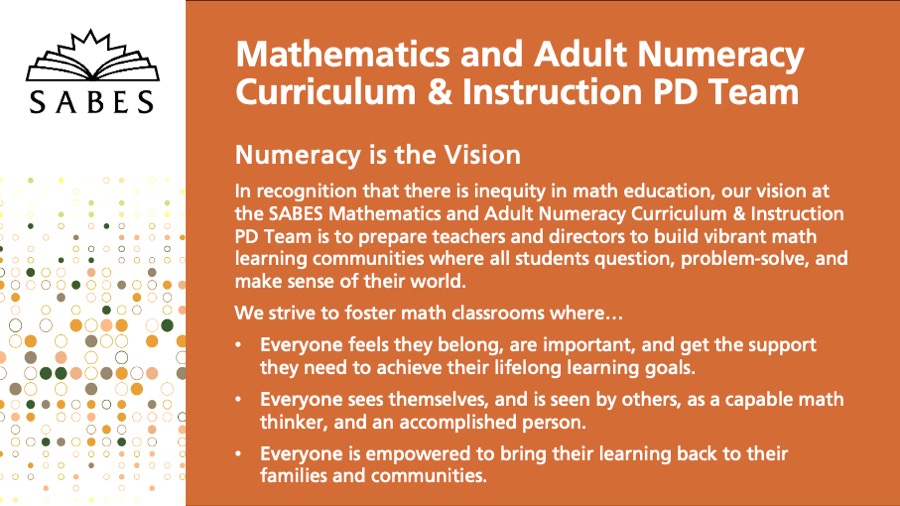
SABES is creating a coordinated resource bank for anti-racism, diversity, equity, and inclusion (ADEI) materials across all of our PD teams, pulling together the resources already on this website and adding new ones. We highlight some specific math-related resources to delve into right now.
- LGBTQIA+ MATH RESOURCES
- LATINX/HISPANIC HERITAGE MATH RESOURCES
- NATIVE AMERICAN HERITAGE MATH RESOURCES
- BLACK HERITAGE MATH RESOURCES
- WOMEN'S HISTORY MATH RESOURCES
- ASIAN AMERICAN PACIFIC ISLANDER HERITAGE MATH RESOURCES
![]() Read & Reflect:
Read & Reflect:
The Crucial Cs: A Frame for Thinking about Classroom Culture
A Pathway to Equitable Math Instruction Toolkit
This toolkit of resources was created to help math teachers develop an anti-racist math practice. It’s divided into 5 "strides" :
- Dismantling Racism in Math Instruction
- Fostering Deep Understanding
- Creating Conditions to Thrive (zip file)
- Connecting Critical Intersections, and
- Sustaining Equitable Practice
Toolkit for Mathematics in Context: A Pedagogy of Liberation
This companion guide to the article of the same name can help teachers think about how to humanize math in our own classrooms. It explores some essential questions around (1) understanding our own personal and cultural relationships with math, (2) honoring marginalized traditions, knowledge, and contributions, (3) teaching in a culturally sustaining way, honoring student identities and relationships to math outside of school, and preparing students to see math as a tool for naming inequity and taking action against injustice. The guide includes a version of Learning for Justice’s Social Justice Standards, adapted for the mathematics classroom! The adaptation includes goals for both teachers and students under the domains of Identity, Diversity, Justice, and Action.
![]() Build into a Lesson
Build into a Lesson
Math Teachers: The Key to Ending Racism
Math teacher/coach/author Max Ray-Riek makes the case for what math teachers can do to end racism, both in terms of math content and in terms of addressing our implicit biases. Max shares his score on the Implicit Association Test for Race and explains what it means to him.
Let your students see people who look like them as valuable contributors to the art of mathematics. The goal of The Mathematicians Project is to take 10-15 minutes a week to research a mathematician from a marginalized identity and spend 5 minutes in class telling your students about them, including a picture. The project was developed by MS/HS math teacher Annie Perkins, who created a spreadsheet called “Not Just White Dude Mathematicians” to help teachers. Have your students research a mathematician who reflects their identities, and they can send it in to be added to the list. Also useful on the site are additional resources for researching mathematicians who are Black, Latinx, female, Indian, and Native American.
Amplify Math Mathematician Profile Cards
This set of mathematician profile cards includes 19 biographies of important mathematicians from around the world. These are used in a card matching activity where participants are given clues about the lives and discoveries of other mathematicians in the room.
![]() Watch and Think
Watch and Think
Although he focuses on K-12 learners, some of Dr. Jim Ewing's simple strategies are useful for adult educators. View his video collection.
Attribution: graphics are from www.flaticon.com


